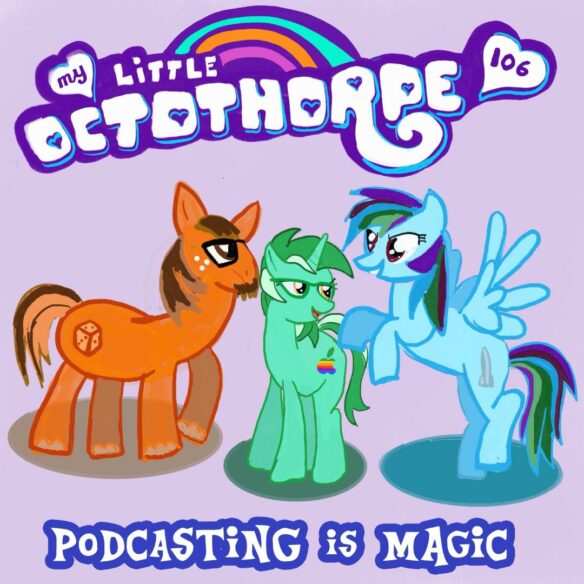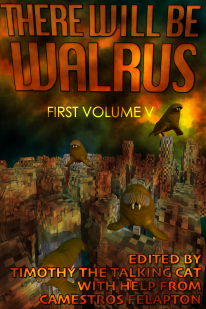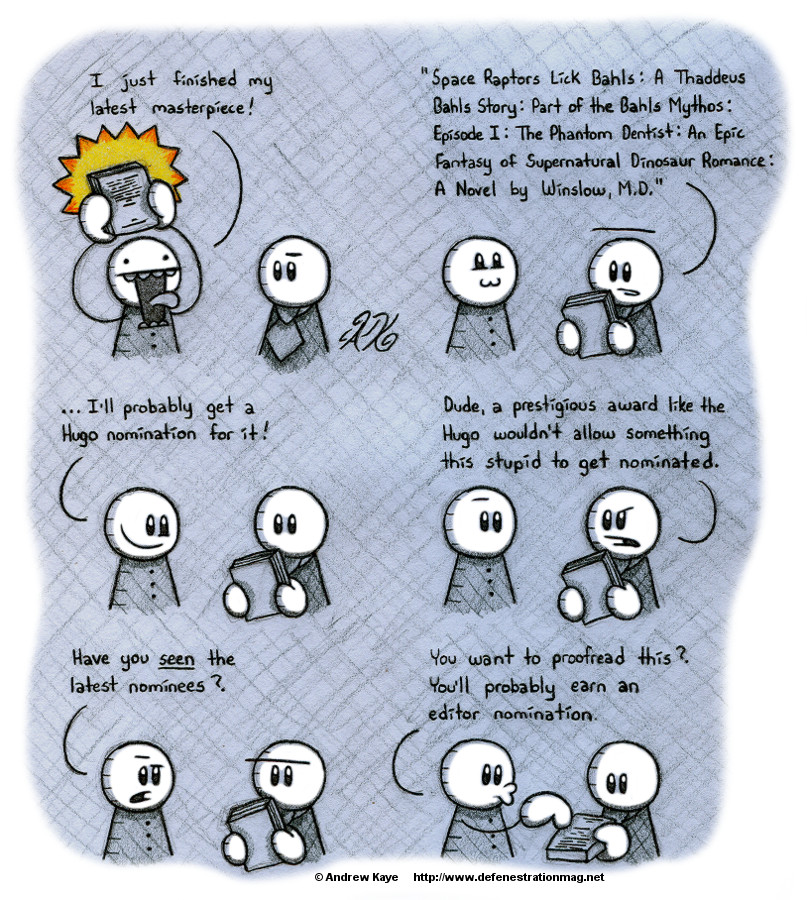(1) JAMES A. MOORE (1965-2024). [Item by Anne Marble.]Horror and fantasy author James A. Moore died March 27. Christopher Golden made the announcement in a concise obituary on Facebook.
Celebrated horror and fantasy author James A. Moore passed away this morning at the age of 58. Moore was the author of more than fifty horror and fantasy novels, including the critically acclaimed Fireworks, Under The Overtree, Blood Red, the Serenity Falls trilogy (featuring his recurring anti-hero, Jonathan Crowley) and the grimdark fantasy series Seven Forges and Tides of War. Moore also co-wrote many novels and stories with his longtime collaborator Charles R. Rutledge.
His early career highlights included major contributions to White Wolf Games’ World of Darkness, and he was especially proud of his first comic book script sale, to Marvel Comics original series set in the world of Clive Barker’s Hellraiser. A prolific and versatile writer, Jim wrote novels based on various media properties, including Alien, Buffy the Vampire Slayer, and The Avengers.
He was nominated for the Bram Stoker Award three times, for his novel Serenity Falls, in the long fiction category for Bloodstained Oz, a collaboration with Christopher Golden, and as editor (with Golden) for the groundbreaking horror anthology The Twisted Book of Shadows, for which the pair won the Shirley Jackson Award.
Beyond his work, Jim Moore was a much-beloved figure in the horror community, a tireless champion of other writers and their work, who mentored dozens of new writers, relentlessly urging them to pursue their desire to tell stories. He is survived by his wife, Tessa Moore, and his legions of readers. No wake or funeral is planned, but a celebration of life will be held sometime in April.
And on his own blog Golden has written a longer and more personal remembrance: “James A. Moore”.
Many writers are remembering Moore as a supportive friend and a mentor.
A couple of GoFundMe campaigns were established by Camp Necon to help James A. Moore (and his family). There was one established to help him during a cancer battle, and there was a more recent one established to help both him and his wife with medical expenses after he beat cancer: “Fundraiser for James A. Moore by Camp Necon : Please Help Jim & Tessa Moore (COVID-19 Expenses)”.
Now a GoFundMe has been started for his memorial expenses.
“Fundraiser by Christopher Golden : James A. Moore Final Wishes and Memorial Expenses”.
This is hard to do. Jim would’ve hated it. He received so much help from so many of you over the past five years, through cancer and Covid and surgeries and job loss and housing loss and amputation. We did two major GoFundMe campaigns during that time. Over the past year, there were moments we talked about doing a third one, but Jim hated the idea of asking again, no matter how much trouble he was in. Sympathy fatigue is real, and so many other people needed help, too.
Jim is going to be cremated. The expense for that is nothing compared to a funeral and a casket and a burial plot, but it’s still costly. I also want to be able to gather everyone together to have a Celebration of Life in a way that honors him. If we could wait a few months, we could risk doing it outside, but I know that everyone is feeling raw and would like to do it sooner. I’d like to do it on a Saturday or Sunday in April.
I’ve set the goal of this GFM to $6K to pay for both his cremation (and associated expenses) and the memorial gathering. I’m not sure it will be enough, but we’ll see. PLEASE NOTE that any monies received over and above the costs of those two things will be given directly to Jim’s wife, Tessa, to help her as she sorts out her next steps. These years have been hard enough, and we’d like to do all we can to help at this time.
(2) WORLDBUILDING ON EARTH. “Arkady Martine in Singapore: On Sci-Fi City Planning and What Makes a ‘City of the Future’” at Reactor.
…Usually in a sci-fi setting, the city functions as a snapshot in time that helps to illustrate how characters engage with their environment; for Martine, this might involve how long it takes for a character to get to their job, or if they even have a job to get to at all. It is not so much concerned with planning, or what drives planning decisions. “Fiction in general, and science fiction specifically, is bad at thinking about city planning as a discipline,” she explains. “Mostly because it feels absolutely dull, it’s worse than economics. I say this as someone who’s trained as a city planner and who loves it very much and actually finds it deeply fascinating and exciting and horrifically political.” More often than not, she finds that the idea of a constructed, planned city in science fiction—with some exceptions—is simply a given.
“In the US they go on and on…that planning is some kind of neutral process, and that the point of a planner is to be a facilitator,” says Martine. “This is why I ended up in politics and policy and not in planning, because to be perfectly honest, it’s bullshit.” She cites the origins of Victorian infrastructure as a starting point for the western view that the constructed environment determines behavior, “which is that there are too many people and too little space and it’s not sanitary, which is all true.” The solution is not actually ‘everyone has to live in a perfect little garden house,’ but that’s the ideal that is constructed.”…
(3) PURPLE FRIENDS AND OTHERS. “’IF’ Trailer — Ryan Reynolds’ Imaginary Friend Comes to Life” – Collider introduces the movie, which arrives in theaters on May 17.
IF focuses on a young girl with the unique ability to see not only her own imaginary friends but also those of others, particularly the ones left behind by their human companions. These forgotten imaginary beings, once vital to the lives of many children, find themselves lonely and at risk of being forsaken indefinitely. In their desperation, they ally themselves with the girl, seeing her as their last chance to be recalled and cherished again before it’s too late.
(4) OCTOTHORPE. Episode 106 of Octothorpe promises a “Fitter Happier Healthier Eastercon”. Which, of course, you want, right?
Octothorpe 106 is now available! You can listen to it while at Eastercon, while travelling to Eastercon, or in defiance of the occurrence of Eastercon. We discuss, er, Eastercon. We talk about transcripts a little, too, before discussing awards, science fiction, cricket, and games. It’s basically a pretty representative episode, is what we’re saying.

(5) PASSING THE PLATE. 13th Dimension ranks “13 Delectable ALEX ROSS Collector Plates”. A whole gallery of images here, naturally.
3. Christmas with the Justice League of America (Warner Bros. Studio Store, 2000). Harking back to some of the classic covers of DC’s Christmas With the Super-Heroes specials, Ross creates a jubilant yuletide scene, literally framed with a bit of melancholy. The classic satellite era League (along with Ross favorites Captain Marvel and Plastic Man) celebrate in their own unique ways: The toast between Martian Manhunter and Red Tornado; Black Canary hanging on Green Arrow’s shoulder; Hawkman and Hawkgirl observing the strange Earth custom of decorating the tree; and my favorite, Green Lantern making the tree lights with his power ring. But all of this is superseded by the Man of Steel beckoning the Dark Knight to let his often-lonely crusade rest for the night, and come inside and join the celebration.

(6) LIADEN UNIVERSE® NEWS. Sharon Lee announced that the eARC (electronic Advance Reading Copy) of Ribbon Dance is now available from Baen Books.
Also, a spoiler discussion page has been set up for those folks who have read the eARC and Want To Talk About It. Here is that link.
(7) TODAY’S BIRTHDAY.
[Written by Cat Eldridge.]
Born March 28, 1912 — A. Bertram Chandler. (Died 1984.) Tonight’s Scroll features a Birthday for a writer from Australia — A. Bertram Chandler.
Did you ever hear of space opera? Of course you have. Well, the universe of Chandler’s character John Grimes was such. A very good place to start is the Baen Books omnibus of To The Galactic Rim which contains three novels and seven stories. If there’s a counterpart to him, it’d be I think Dominic Flandry who appeared in Anderson’s Technic History series. (My opinion, yours may differ.) Oh, and I’ve revisited both to see if the Suck Fairy had dropped by. She hadn’t.

Connected to the Grimes stories are the Rim World works of which The Deep Reaches of Space is the prime work. The main story is set in an earlier period of the same future timeline as Grimes, a period in which ships are the magnetic Gaussjammers, recalled with some nostalgia in Grimes’ time.
But that’s hardly all that he wrote. I remember fondly The Alternate Martians, a novella that he did. A space expedition to Mars that find themselves in the worlds of H.G. Wells, Edgar Rice Burroughs and Otis Adelbert Kline. Why he chose the latter I know not as I’d never heard of him. It’s a great story well told. And fun to boot. It was first published as an Ace Double, The Alternate Martians / Empress of Outer Space. Gateway has released it as a separate epub for a mere buck ninety nine at the usual suspects.
He wrote a reasonably large number of stand-alone-alones, so what did I like? For a bit of nicely done horror, you can’t beat The Star Beasts — yes, I know that there’s nothing terribly original there but it’s entertaining to read; Glory Planet has a watery Venus occupied by anti-machine theocracy opposed by a high-tech city-state fascinating; and finally I liked The Coils of Timeenin which a scientist has created a Time Machine but now needs a guinea pig, errr, a volunteer to go back through time and see what’s there — did it go as planned? Oh guess.
I see that he’s written but a handful of short stories, none of which I’ve read other than the ones in To The Galactic Rim. So who here has?
He’s won five Ditmars and The Giant Killer novel was nominated for a Retro Hugo.
All in all, I like him a lot.
(8) COMICS SECTION.
- Bliss has another take on the shaggy dog story.
- Reality Check hears from Yoda.
(9) SOUNDS FAMILIAR. From the New York Times: “Like My Book Title? Thanks, I Borrowed It.” Just like the Scroll item headlines here, yes?
You see it everywhere, even if you don’t always recognize it: the literary allusion. Quick! Which two big novels of the past two years borrowed their titles from “Macbeth”? Nailing the answer — “Birnam Wood” and “Tomorrow, and Tomorrow, and Tomorrow” — might make you feel a little smug.
Perhaps the frisson of cleverness (I know where that’s from!), or the flip-side cringe of ignorance (I should know where that’s from!), is enough to spur you to buy a book, the way a search-optimized headline compels you to click a link. After all, titles are especially fertile ground for allusion-mongering. The name of a book becomes more memorable when it echoes something you might have heard — or think you should have heard — before.
This kind of appropriation seems to be a relatively modern phenomenon. Before the turn of the 20th century titles were more descriptive than allusive. The books themselves may have been stuffed with learning, but the words on the covers were largely content to give the prospective reader the who (“Pamela,” “Robinson Crusoe,” “Frankenstein”), where (“Wuthering Heights,” “The Mill on the Floss,” “Treasure Island”) or what (“The Scarlet Letter,” “War and Peace,” “The Way We Live Now”) of the book.
Somehow, by the middle of the 20th century, literature had become an echo chamber. Look homeward, angel! Ask not for whom the sound and the fury slouches toward Bethlehem in dubious battle. When Marcel Proust was first translated into English, he was made to quote Shakespeare, and “In Search of Lost Time” (the literal, plainly descriptive French title) became “Remembrance of Things Past,” a line from Sonnet 30.
(10) YOU’VE GOT TO BE KIDDING. “Liu Cixin: ‘I’m often asked – there’s science fiction in China?’” he told the Guardian.
…Science fiction was a rarity in China when Liu was growing up because most western books were banned. Living in a coal mining town in Shanxi province as a young man, he found a book hidden in a box that once belonged to his father. It was Journey to the Centre of the Earth by Jules Verne, and Liu read it in secret, and in doing so forged a lifelong love of science fiction….
(11) BREAD FOR CIRCUSES. “The film fans who refuse to surrender to streaming: ‘One day you’ll barter bread for our DVDs’” in the Guardian. Anybody who’s bought an ebook from Amazon doesn’t need a natural disaster to convince them about the advantages of owning physical media.
When a hurricane struck Florida in 2018, Christina’s neighborhood lost electricity, cell service and internet. For four weeks her family was cut off from the world, their days dictated by the rising and setting sun. But Christina did have a vast collection of movies on DVD and Blu-ray, and a portable player that could be charged from an emergency generator.
Word got around. The family’s library of physical films and books became a kind of currency. Neighbors offered bottled water or jars of peanut butter for access. The 1989 Tom Hanks comedy The ’Burbs was an inexplicably valuable commodity, as were movies that could captivate restless and anxious children.
“I don’t think 99% of people in America would ever stop to think, ‘What would I do if I woke up tomorrow and all access to digital media disappeared?’ But we know,” Christina told me. “We’ve lived it. We’ll never give up our collection. Ever. And maybe, one day, you’ll be the one to come and barter a loaf of bread for our DVD of Casino.”…
(12) IN SPACE NOBODY CAN HEAR YOU LAUGH. “Spaceballs: 12 Behind the Scenes Stories of Mel Brooks’ Ludicrous Sci-Fi Adventure” at Moviemaker. Here’s one I never thought of:
Spaceballs Was Also Inspired by It Happened One Night
One of the biggest reference points for Spaceballs wasn’t a sci-fi film, but a Frank Capra classic, 1934’s It Happened One Night. The film was the first to sweep the top five Oscar categories — Best Picture, Best Director, Best Adapted Screenplay, Best Actor and Best Actress.
The film follows an heiress (Claudette Colbert) who flees her dull groom on her wedding day and falls for a cool regular guy played by Clark Gable. “We took that same basic plot and shot it into space!” Brooks wrote in his memoir.
In Spaceballs, Princess Vespa of Planet Druidia (Daphne Zuniga) flees her dull groom, Prince Valium, on her wedding day, and falls for a cool regular guy named Lone Starr (Bill Pullman).
(13) DON’T ASK? “Artemis astronauts will carry plants to the moon in 2026” reports Space.com. Strangely, neither this article nor the NASA press release it’s based on say what specific plants will be part of the experiment.
The first astronauts to land on the moon in more than half a century will set up a lunar mini-greenhouse, if all goes according to plan.
NASA has selected the first three science experiments to be deployed by astronauts on the moon’s surface on the Artemis 3 mission in 2026. Among them is LEAF (“Lunar Effects on Agricultural Flora”), which will study how space crops fare in the exotic lunar environment.”LEAF will be the first experiment to observe plant photosynthesis, growth and systemic stress responses in space-radiation and partial gravity,” NASA officials wrote in a statement Tuesday (March 26) announcing the selection of the three experiments….
(14) WAS HE LOST IN SPACE? Dan Monroe investigates “Whatever Happened to ROBBY The ROBOT?”
(15) VIDEO OF THE DAY. Slashfilm covers (and uncovers) “The Most Controversial Costumes In Sci-Fi History”.
The worst superhero costume in history, space bikinis, and a leather trenchcoat that sparked a media frenzy — sci-fi costumes don’t get much more controversial than this.
[Thanks to Andrew Porter, John King Tarpinian, Chris Barkley, Anne Marble, Kathy Sullivan, Cat Eldridge, SF Concatenation’s Jonathan Cowie, Steven French, and Mike Kennedy for some of these stories. Title credit belongs to File 770 contributing editor of the day Andrew (not Werdna).]



